In ‘My Solitude’ with Toni Cade Bambara
By Guest Contributor on November 21, 2014By Pamela Hooks
I was young and on the fast track to nowhere. I knew nothing and didn’t appreciate that very statement. I know nothing.
 It was 1982, and I was working at the leading local TV station as a producer. I had married my neighborhood sweetheart at nineteen. He was in the Airforce, and we had just returned to Philadelphia from a four year tour in rural North Dakota, where I learned that being far from what you know wasn’t so bad really. But I was happy to return to the colorful concrete village of my youth with a real appreciation of where I’m from. West Philadelphia born and raised. My husband was now stationed in Newport News, Virginia, but after four years of the Midwest, it wasn’t enough to just be in Virginia; I had to be home. So, I accepted a gig at WPVI-TV, and we were a new commuter couple. An apartment in Virginia and one in Philly. Weekends for coupling. He was my real first love. We stumbled into marriage and did what we thought was working. So to me, it was working. But unbeknownst to me, it wasn’t working for him.
It was 1982, and I was working at the leading local TV station as a producer. I had married my neighborhood sweetheart at nineteen. He was in the Airforce, and we had just returned to Philadelphia from a four year tour in rural North Dakota, where I learned that being far from what you know wasn’t so bad really. But I was happy to return to the colorful concrete village of my youth with a real appreciation of where I’m from. West Philadelphia born and raised. My husband was now stationed in Newport News, Virginia, but after four years of the Midwest, it wasn’t enough to just be in Virginia; I had to be home. So, I accepted a gig at WPVI-TV, and we were a new commuter couple. An apartment in Virginia and one in Philly. Weekends for coupling. He was my real first love. We stumbled into marriage and did what we thought was working. So to me, it was working. But unbeknownst to me, it wasn’t working for him.
 I spent my weekends without him at a wonderful Black bookstore—My Solitude Books—on a relatively quiet section of Germantown Avenue. One of those avenues that held a list of varied communities that stretched from the mean streets of North Philly to the cow pastures of neighboring city suburbs. Njeri was the owner, human observer, a walking encyclopedia of our history and those who knew our history. A solitary sage with a gentle spirit and a generous heart who was the eyes and ears and advocate of Philly’s newly emerging cultural community. My Solitude. The name alone was never further from the truth during the 80’s. You never know who you would meet—authors, musicians, artists.
I spent my weekends without him at a wonderful Black bookstore—My Solitude Books—on a relatively quiet section of Germantown Avenue. One of those avenues that held a list of varied communities that stretched from the mean streets of North Philly to the cow pastures of neighboring city suburbs. Njeri was the owner, human observer, a walking encyclopedia of our history and those who knew our history. A solitary sage with a gentle spirit and a generous heart who was the eyes and ears and advocate of Philly’s newly emerging cultural community. My Solitude. The name alone was never further from the truth during the 80’s. You never know who you would meet—authors, musicians, artists.
I’m sure this is where I first met Toni Cade Bambara, because this was her neighborhood too. My Solitude was a small storefront in Philadelphia’s Mount Airy neighborhood of well-to-do middle-class hippies and professionals, who kept gardens, coops and mixed race families. On this stretch of G’town Ave, there was a ribs place and a Black art gallery and My Solitude fit into the scene perfectly. Her place was airy and full of light, the scent of incense and good music. When Toni would venture in, she and Njeri would engage in knowing convo on new books that came in from the black presses—reminiscing on personal experiences from back in the day and histories on people, places and things that only Toni—the Harlem native could only know and tell. Toni wore her afro like a crown, and she liked color and Egyptian scarabs. In the fall, she wore ponchos and capes that made her look majestic even in sneakers.
She opened my world, opened my eyes. I saw the political and poetry in everything now. Together, Toni and Njeri would break down everything with a fine tooth comb—from the politics of government cheese to the best places to find vegetarian food or chicken wings and then stuck the bush comb pick firmly into the back of all of it to bring it back to the state of black folk today—the good bad and the ugly. Whenever I was in their company I walked away feeling as if I was given some wisdom to do something with, and they usually suggested just how I should activate this new wisdom and information to lift myself and my people.
They had some real heavy lifting for me the day after I had just learned from my husband—while on a romp to Virginia—that he was seeing another woman and I was devastated. I walked into the bookstore just before closing and Njeri was there alone. I recounted the story of how he told me our seven year marriage was over because he fell in love with another woman at the Air base. I cried and she felt sorry for me. Toni stopped by and she thought that chicken wings and beer was in order, so we closed shop sat on the floor and ate hot crispy chicken wings, as Toni recounted famous stories of revenge served cold, hell hath no fury as a woman scorned. Hot grits for Al Green, but was that good enough for him? She said that I have every right to get mad and do something about it. Something that he could remember in the same way I will remember this moment. She was all about who I should be mad at and it should be completely directed to the one I am really upset with—him! She had a friend who had destroyed her man’s extensive jazz record collection, the art of tire slitting, and of course painting your anger on the beloved car. We sipped beer laughed and howled and plotted my revenge. Activism was a way of life for Toni and it begins at home. I felt redeemed and rejuvenated that day.
I later moved out of the apartment I was living in. It held too many memories. I moved into an apartment not far from the bookstore and soon after—unbeknownst to me or Toni—she had moved into my building and on the same floor. I witnessed her in loving mother-mode with teenage Karma. She was truly a good neighbor. Making her signature meal with only garlic, spaghetti and olive oil and since I was just down the hall I was able to swing my legs under her kitchen table and swap more stories of life. When I moved to the west coast to live, Toni held on to my prized four foot poster of Miles Davis (from his Decoy album) for me, and she sent me off to L.A. with a reality check on what I should expect from the Hollywood crowd, and a phone number of another soul sister who I could call on for the connection—Sandra Sharpe aka S. Pearl, who I am friends with still.
Women like Toni and Njeri instilled the beauty and importance of being your sister’s keeper, and to share your knowledge with an open hand.
When I remember Toni Cade Bambara, I remember to enter into all rooms knowing that I know nothing—so listen.
Pamela Hooks, mult-media producer, social change artist, performer, and native of Philadelphia, was introduced to the arts through community dance and theater. Growing up in West Philadelphia, she was surrounded by artists and dancers and at an early age began taking dance classes with some of Philly’s most notable dance instructors, Faye Snow and Arthur Hall. Her passion for performance was her entrée into a lifelong career in television and film as a producer and filmmaker. As a television producer, she worked for Philadelphia’s WPVI-6ABC and CBS-3, as well as Lifetime Television, Discovery, and The Montel Williams Show. Her professional mentors include Emmy-award winning director Paris Barclay, award winning producer Darlene Hayes (Donahue and Emeril Live), and Reuben Cannon (Paramount TV). Pamela’s media recognition includes an Excellence in Media/Entertainment (Power 99/Clear Channel), Pennsylvania Broadcasters, Keystone Award—Excellence in Broadcasting, editor, Move: Images and Reality (WPVI-TV), and recognition from the American Women in Radio and Television for the HIV-AIDS documentary, Sister To Sister: Making Healthy Choices. In 2008, she was selected to travel to Guinea, West Africa to produce, and direct a documentary, In Search of Mali Sadjo: Kulu Mele’s African Dance Expedition, for the PEW Center for Arts & Heritage/Dance Advance. As a multimedia artist, she is also in demand as a voice-over actor, lending her voice to animated productions, documentaries, as well as local and national radio commercials and political ads. Today, she continues to lend her experience in television and public relations as a consultant to arts and social change non-profit organizations in need of electronic media exposure. Her proudest productions ever are her children Ayoola and Romare.
You may also like...
1 Comment
All Content ©2016 The Feminist Wire All Rights Reserved

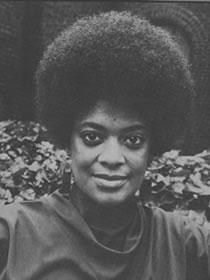
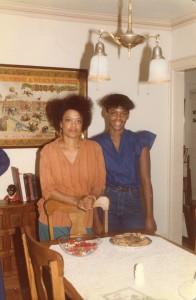

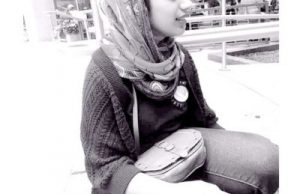
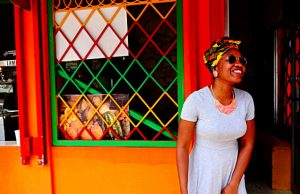
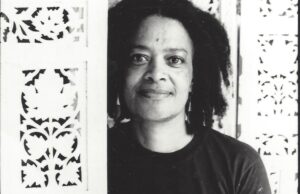
Pingback: Afterword: Toni Cade Bambara's Living Legacy - The Feminist Wire | The Feminist Wire